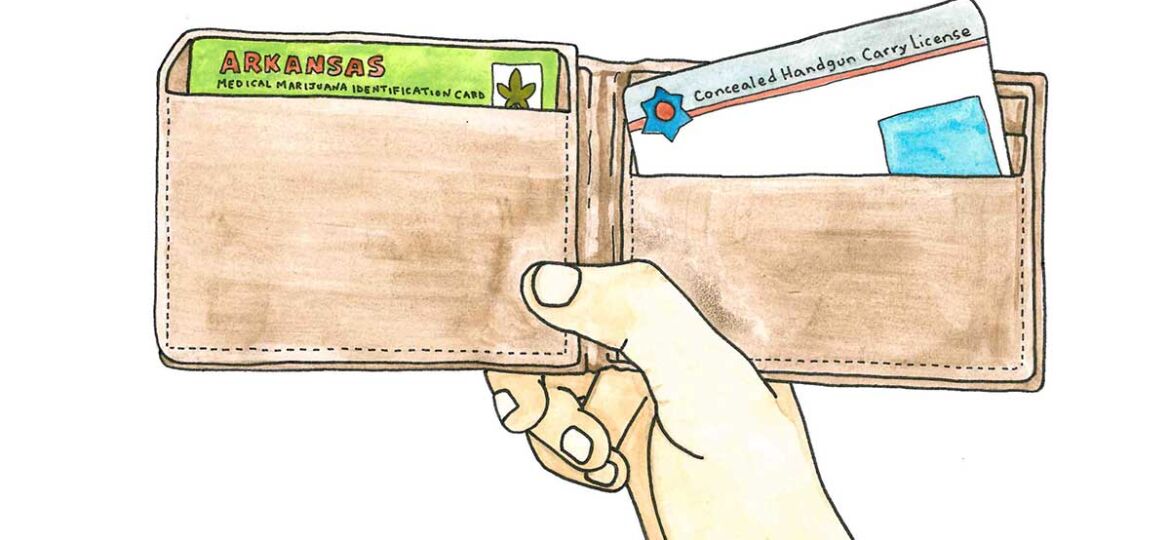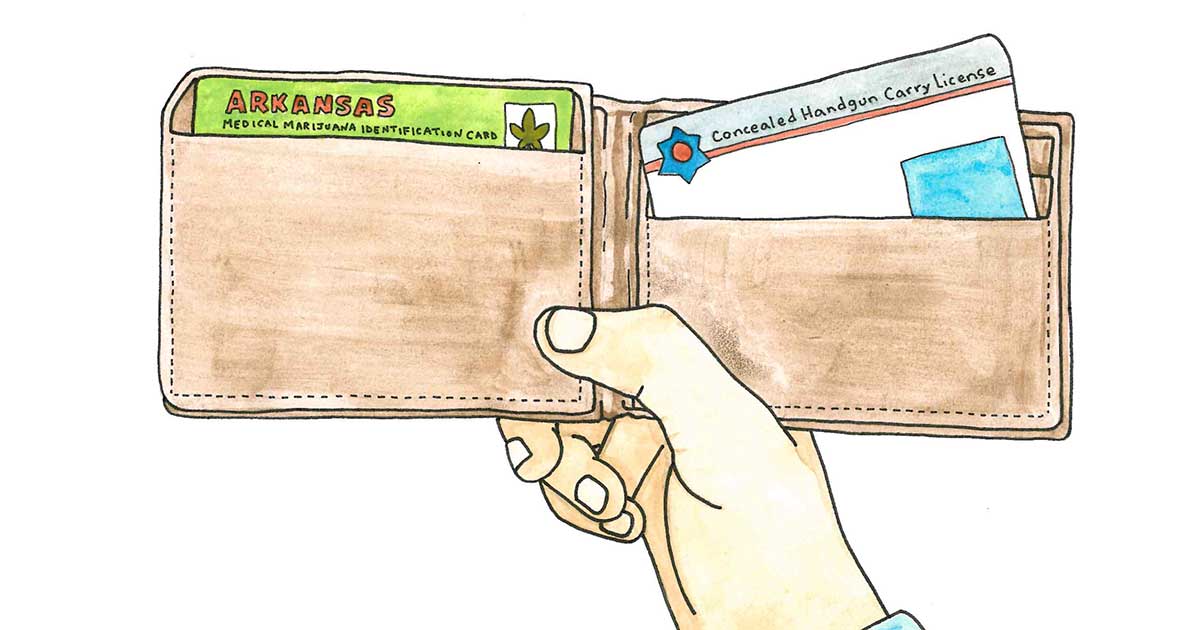

Holding a medical marijuana patient card is no longer a disqualifier for obtaining a gun permit in Arkansas, not that such a permit was required in gun-happy Arkansas in the first place. Regardless, a recent change in state law has caught the attention of federal firearms officials who say the new law raises concerns about public safety.
Now, gun-toting medical marijuana users may be in a bind trying to navigate conflicting state and federal laws.
Advertisement
Arkansas residents don’t actually need a special permit to carry their favorite firearm in their home state, but concealed handgun carry licenses are available to those who want them. The licenses could come in handy for Arkansans who want to carry a gun in one of the states that does require permits.
Last year, the state passed a law to prevent the State Police from disqualifying medical marijuana cardholders who apply for concealed handgun permits. The Bureau of Alcohol, Tobacco, Firearms and Explosives wasn’t too happy about it.
Advertisement
The heart of the matter is that the ATF allows folks who hold an Arkansas carry license to skip a background check when buying from a licensed dealer. It makes sense that if the prospective buyer has already passed one background check, he wouldn’t need another one. Except Arkansas doesn’t disqualify medical marijuana cardholders anymore, and the feds still consider marijuana to be a controlled substance.
Mary Claire McLaurin, the vice president of compliance at multistate cannabis operator Good Day Farms, said the competing demands of state and federal law have put the state’s lawmakers and state agencies in a bind. McLaurin is well-versed in the subject after spending seven years with the State Police as the agency’s regulatory counsel and legislative liaison.
Advertisement
The permit issue is particularly difficult to navigate in Arkansas because the right to be a medical marijuana patient and to bear arms are in the state Constitution. Such rights are considered to be on par with one another unless there is a specific exception in the law, she said.
“You are bound to uphold the Constitution of the state of Arkansas as well as the federal Constitution,” she said. “I think the [Arkansas] lawmakers and the state agencies are kind of in a bind until the federal government gets their stuff together and figures this out,” she said.
Advertisement
The law in question is Act 757 of 2023, sponsored by state Rep. Aaron Pilkington (R-Knoxville). The measure changed state law to prevent the Arkansas State Police from disqualifying cardholders and to prevent the state Department of Health from telling State Police who the cardholders are.
Pilkington said he sponsored the bill after hearing from constituents. One, Pilkington said, pointed out that a prescription for Percocet, a prescription pain reliever, does not disqualify anyone from legally owning a gun.
Advertisement
“I never thought about it that way,” Pilkington said.
The medical marijuana restriction on gun ownership was hypocritical in Pilkington’s eyes. Some military veterans use medical marijuana to treat post-traumatic stress disorder, he said, but the law prevented them from “enjoying some of the liberties that they fought for.”
Advertisement
Pilkington wasn’t sure how the bill would be received by his legislative colleagues, joking that Republicans might hate it because it was a marijuana bill and Democrats might hate it because it was a gun bill. In the end, the bill was pretty popular with members of both parties, passing the House 82-5 and passing the Senate 26-3. Republican Gov. Sarah Sanders signed the bill into law.
In October, the ATF chimed in on the new law. Marijuana is a Schedule I controlled substance and anyone who uses it is “prohibited by federal law from possessing firearms and ammunition,” its letter said.
Joan Shipley, a lawyer for the Arkansas State Police, said Arkansas can’t ensure that all of the state’s concealed carry handgun license holders and applicants are not controlled substance users because the application for the license doesn’t ask if the applicant holds a medical marijuana card. Shipley also said an applicant can’t be considered a chronic controlled substance abuser solely based on whether the person is a medical marijuana patient.
Arkansas isn’t the only state at an impasse with the ATF over discrepancies between state and federal law on cannabis and guns. Minnesota, Florida, Oklahoma and Mississippi are among the states that have passed laws to protect medical marijuana patients’ Second Amendment rights.
Advertisement

